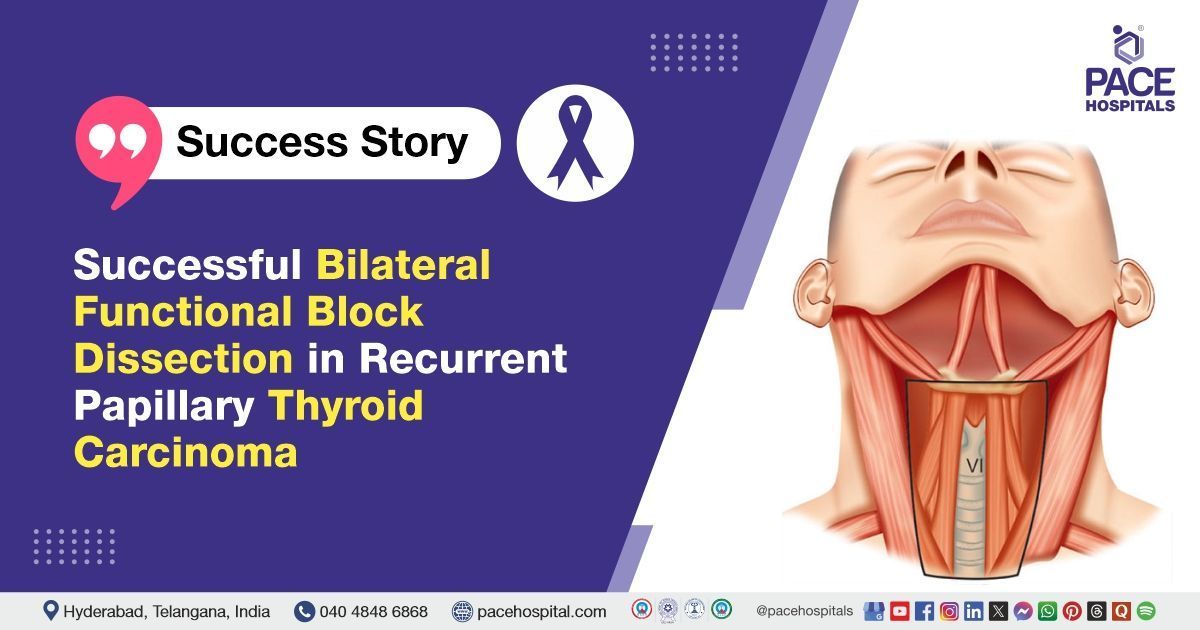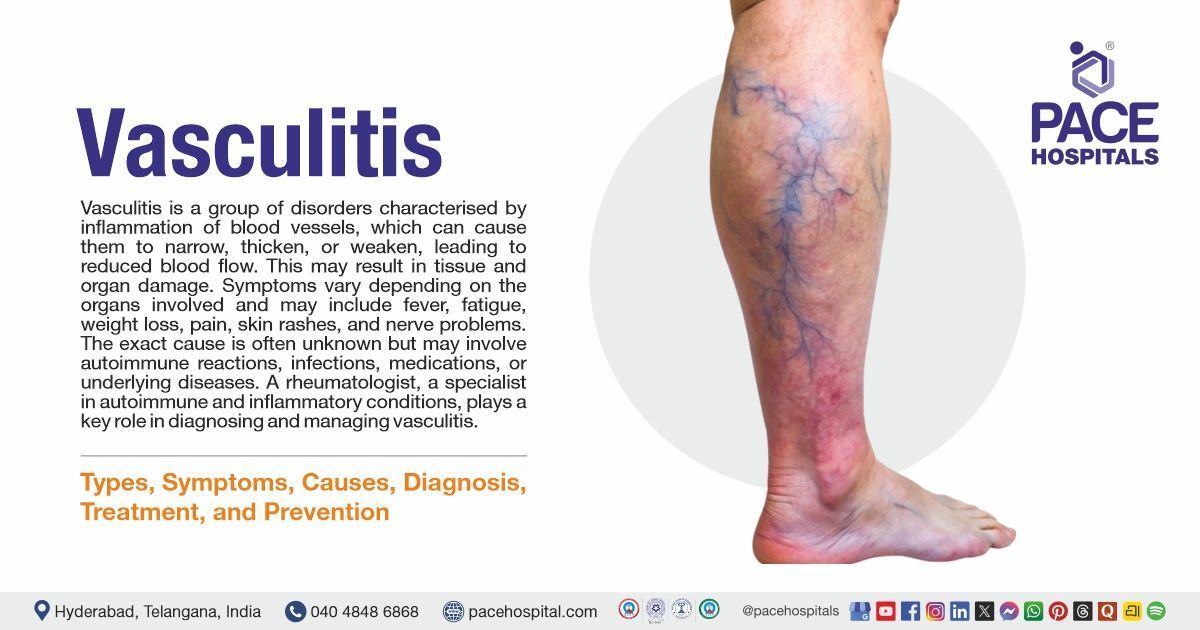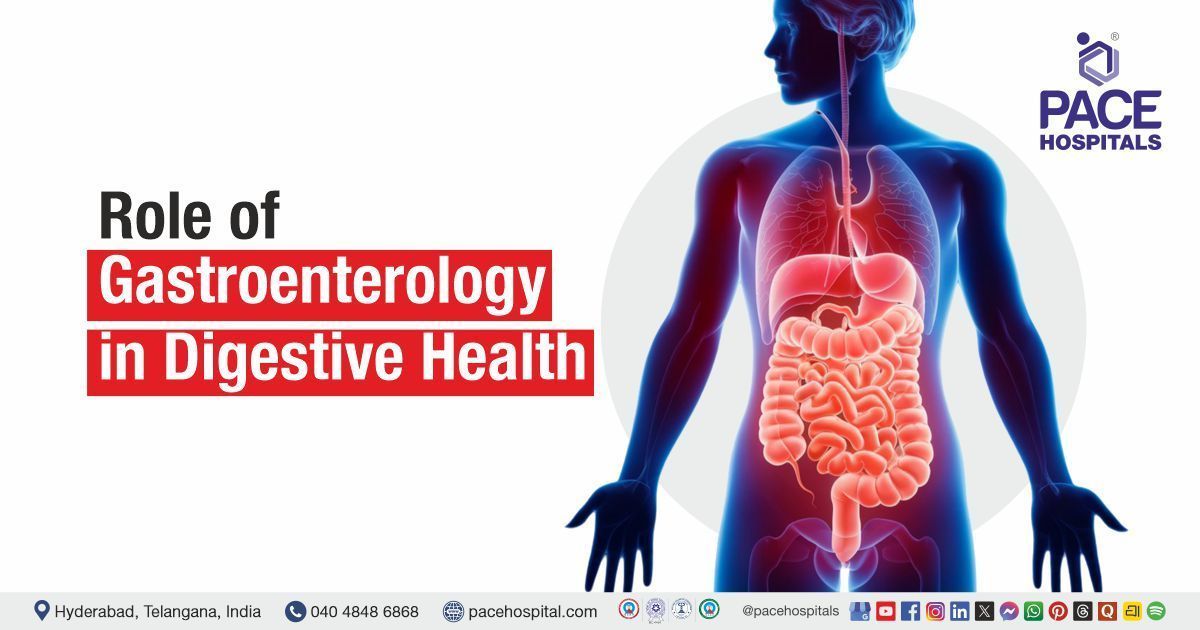Successful Bilateral Functional Block Dissection in Recurrent Papillary Thyroid Carcinoma
PACE Hospitals
PACE Hospitals' Oncology team successfully performed a
bilateral functional block dissection of neck lymph nodes for a 49-year-old male with recurrent papillary thyroid carcinoma that was well differentiated with regional (nodal) metastases and suspected lung involvement.
A 49-year-old male patient with complaints of swelling in the front of the neck on the lower part of the right side, which has been slowly increasing in size for the past two months, was presented to the consultant surgical oncologist, Dr. Ramesh Parimi, at PACE Hospitals, Hitech City, Hyderabad.
Medical History
Delving further, it was understood that the patient had a swelling in the front of the neck on the lower part of the right side, which had been slowly increasing in size for the past two months which led to his admission to the PACE Hospitals for additional care and management. He had a history of carcinoma thyroid, a papillary variant, which was operated on two years ago followed by radioactive iodine therapy. He is a known case of
diabetes mellitus and is on medication.
Diagnosis
Upon being admitted to PACE Hospitals, his general condition was examined, and his vitals were stable. On neck examination, there are movable and non-tender lymph nodes were found on the right side but no lymphadenopathy was observed on the left. Tests indicated insufficient calcium and elevated TSH levels, so he was prescribed thyroid hormone and calcium supplements. A PET scan showed metastatic lymph nodes on the right side, a diaphragmatic node, and a lung nodule.
Evaluating the diagnostic investigations, the patient was diagnosed with papillary carcinoma, a type of thyroid cancer that had returned despite previous treatment. This malignancy (cancer) is well-differentiated, so the cells still seem like normal thyroid cells. The cancer has spread to neighbouring lymph nodes in the neck, indicating regional metastasis. There is also a suspicion that the cancer has spread to the lungs.
Treatment
After consultations with the consultant surgical oncologist, Dr. Ramesh Parimi, along with the consultant medical oncologist, Dr. Navya Manasa Vuriti, it was determined that a bilateral functional block dissection of the neck lymph nodes was the effective method for treating the patient.
Bilateral functional block dissection of the neck lymph nodes is a surgical operation that removes lymph nodes from both sides of the neck. This is done to treat or prevent cancer from spreading, especially if it has spread to the lymph nodes. Depending on the location and extent of the cancer, the surgery may also remove some surrounding tissue in addition to the lymph nodes. The goal is to remove any cancer cells and decrease the likelihood of further spread while keeping as much normal function in the area as possible.
A major surgical profile was performed for the patient before the surgery. A whole-body PET scan detected metastatic lymph nodes on the right side of the neck, a node near the diaphragm, and a lump in the right lung. Before surgery, the patient's calcium and TSH levels were corrected.
Performing these investigations before surgery ensures that the oncologists have a comprehensive understanding of the patient's condition and anatomy, which guides them in performing the surgery effectively and helps reduce the risk of complications.
With necessary investigations done & clearances obtained which included a pre-anesthesia checkup, the patient underwent bilateral functional block dissection of the neck lymph nodes surgery. The procedure was supervised by the consultant surgical oncologist, Dr. Ramesh Parimi, and it was accomplished devoid of any complications.
During the procedure, a biopsy of the right neck node revealed papillary thyroid cancer cells. The patient then underwent a bilateral radical neck dissection, which removed lymph nodes from both sides of the neck.
Aftermath
The post-operative period was uneventful. The necessary medicines, including corticosteroids, antibiotics, vitamin D supplements, analgesics, antipyretics, laxatives, thyroid medication, benzodiazepine, proton pump inhibitors, mucolytic agents, and other supportive care were given along with the counseling. The patient was discharged upon achieving hemodynamic stabilization, with the necessary medications, and advised to continue routine diabetic medication, steam inhalation twice daily with mucomix, and to take care of the drain as advised and proper dressing of the wound as advised.
The patient was also instructed to contact PACE Hospitals in case of fever, abdominal pain, or vomiting. After 5 days, the patient was asked to follow up with Dr. Ramesh Parimi with a prior appointment.
Share on
Request an appointment
Fill in the appointment form or call us instantly to book a confirmed appointment with our super specialist at 04048486868











